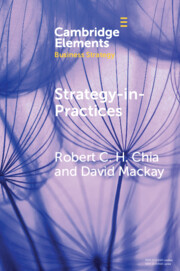Refine search
Actions for selected content:
7 results
Navigating paradox through strategic agility: A case study from the mobility sector
-
- Journal:
- Journal of Management & Organization , First View
- Published online by Cambridge University Press:
- 03 September 2025, pp. 1-22
-
- Article
-
- You have access
- Open access
- HTML
- Export citation
Together we win: The impact of board internationalization and board size on strategic change
-
- Journal:
- Journal of Management & Organization , First View
- Published online by Cambridge University Press:
- 21 July 2025, pp. 1-23
-
- Article
-
- You have access
- Open access
- HTML
- Export citation
Group Polarization in Board Decisions about Strategic Change: Evidence from Chinese Publicly Listed Companies (2008–2018)
-
- Journal:
- Management and Organization Review / Volume 19 / Issue 2 / April 2023
- Published online by Cambridge University Press:
- 30 March 2023, pp. 201-232
-
- Article
- Export citation

Strategy-In-Practices
- A Process-Philosophical Perspective on Strategy-Making
-
- Published online:
- 06 March 2023
- Print publication:
- 23 March 2023
-
- Element
- Export citation
Environmental Jolts, Clocks, and Strategic Change in the U.S. Airline Industry: The Effects of Deregulation and the 9/11/2001 Terrorist Attacks
-
- Journal:
- Business and Politics / Volume 13 / Issue 4 / December 2011
- Published online by Cambridge University Press:
- 20 January 2017, pp. 1-35
-
- Article
- Export citation
Managerial change and strategic change: The temporal sequence
-
- Journal:
- Journal of Management & Organization / Volume 23 / Issue 1 / January 2017
- Published online by Cambridge University Press:
- 06 December 2016, pp. 46-73
-
- Article
-
- You have access
- HTML
- Export citation
Strategic flexibility and change: The impact of social networks
-
- Journal:
- Journal of Management & Organization / Volume 18 / Issue 1 / January 2012
- Published online by Cambridge University Press:
- 02 February 2015, pp. 2-15
-
- Article
- Export citation
